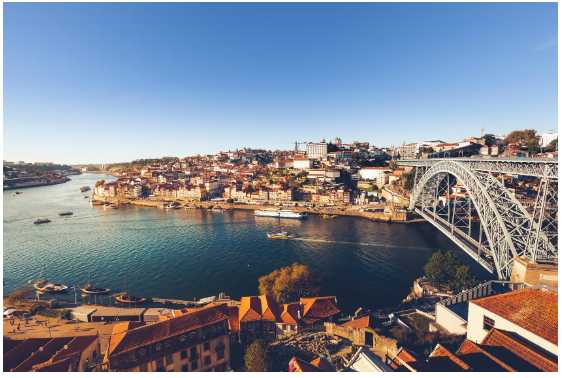Portugal is renowned for its sun, sea, and beaches that stretch for more than 520 miles, making it one of the most popular tourist destinations in the world. Its prime location on the Iberian Peninsula is another reason for its popularity. It should come as no surprise that the country pulls in a large number of foreign workers who are looking to enjoy the climate and lifestyle of the Mediterranean.
Because tourism is such a significant contributor to the economy of Portugal, there is a plethora of opportunities to gain work experience in the field of teaching English to speakers of other languages. In spite of this, competition for jobs after graduation is fierce, particularly in major cities like Lisbon and Porto, where the unemployment rate is only 5.9%.
Because of this, having a solid understanding of, and being fluent in, Portuguese will put you in a better position than other foreign candidates who know very little or nothing of the language at all. It is recommended that you complete a class in your home country before beginning the process of looking for work.
Jobs available in Portugal.
The economy of Portugal is primarily driven by the service sector, with tourism playing an especially significant role. There are also employment opportunities available in the fields of real estate, aerospace, and biotechnology, in addition to the field of telecommunications.
IT is one of the most important growth areas in the country, and Lisbon has become something of a hub for new businesses.
POPULAR GRADUATE JOBS
- Biotechnology
- Chemical products
- Healthcare
- IT
- Pharmaceuticals
Other major industries in Portugal include:
- automobiles
- construction
- electronics
- footwear
- hospitality
- textiles
- tourism
- transportation.
The capital city of Lisbon is home to a number of global companies including:
- Mercedes-Benz
- Nestlé
- Nokia
- Samsung
- Volkswagen.
Search for job vacancies in Portugal at:
- Empregos online (in Portuguese)
- EURES (for European Union (EU), European Economic Area (EEA) or Swiss nationals)
- Indeed.pt (in Portuguese)
- Jobs In Lisbon (English-speaking jobs)
- Reed - Jobs in Portugal
Skills shortages
There's a shortage of skilled workers in:
- agriculture
- communications (mainly call centre managers)
- engineers
- healthcare (doctors and nurses)
- hotel and restaurant staff.

The steps to take to get a job in Portugal
Because there is so much competition for available positions, citizens of the European Union (EU) and the European Economic Area (EEA) should begin their job search as soon as they possibly can. If you are not a citizen of a member state of the EU, you are required to look for and obtain employment before moving to the country.
When applicants submit their resumes and applications online, various employers may choose to ask either standard questions or open-ended questions. While CVs can be up to three pages long, cover letters should never be longer than one side of A4; however, it is still best to aim for two pages. Cover letters should never be longer than one side of A4. In the absence of any contrary instructions, you should submit your application in Portuguese.
Networking is essential for non-citizens who are looking for work, and speculative applications are encouraged, especially at small and medium-sized businesses (SMEs).
To narrow down their pool of potential employees, a lot of businesses conduct multiple rounds of interviews, and some also use psychometric or technical testing. Be prepared to wait in order to find out the outcome of the interviews you've participated in. This may take some time.
Summer jobs
Seasonal work in the tourism industry can sometimes provide a stepping stone into an entry-level graduate job, in addition to assisting one in improving their language skills.
In the hospitality and food service industries, temporary workers are in particularly high demand. Bars and restaurants are typically good places to look for casual employment opportunities.
If you have some experience working in a nursery or with younger children, you might also be able to find work as an au pair.
Many people who move abroad find that participating in volunteer work is a beneficial experience. In addition to putting your Portuguese language skills to the test and assisting you in gaining a deeper understanding of Portuguese culture, it will also assist you in developing long-lasting contacts and enhancing your resume.
There is a wide variety of opportunities available, some of which are focused on social care and the environment, while others are concerned with cultural activities and sports. A European grant will provide financial support on top of covering living expenses, transportation costs, medical expenses, and other incidentals like food and insurance premiums for successful applicants.
Teaching jobs
The ability to communicate effectively in English is one that is in high demand. The country is home to a number of English language schools, and in order to work in one of them, you will typically be required to hold a bachelor's degree in addition to a TEFL certification.
You do not need to be fluent in Portuguese upon arrival because it is essential to foster an environment in the classroom where English is the primary language spoken.
Cities such as Braga, Coimbra, Lisbon, and Porto are the ones most likely to have teaching jobs of this kind available for hire. The school year typically runs from September to June, but there are also opportunities to teach during the summer months at various camps.
For a directory of Portuguese language schools, see ESL BASE - TEFL courses in Portugal.
There are also opportunities to teach English in Portugal through the British Council.
Internships
Internships and summer work placements for students can be arranged by:
- AIESEC UK - students and recent graduates
- IAESTE UK - for science, engineering and applied arts students.
Paid five-month, EU-based traineeships can also be found at European Commission - Traineeship.
Portuguese visas
All UK nationals need a long-stay visa if they want to stay in Portugal for more than 90 days in any 180-day period.
There are different types of visa, such as temporary stay (less than one year) and residence (longer than one year). There are also different work visas depending on the type of work you do. Visit the Consulate General of Portugal in London to find out more about types of visas and where to apply.
A formal employment offer from a Portuguese employer is required in order for non-EU citizens to be eligible for a residence permit in Portugal. The process of obtaining a work permit can be challenging because businesses are strongly encouraged to hire Portuguese citizens or nationals of other EU countries in the first instance.
If you are a citizen of the United Kingdom, you should apply for a residence permit from the Embassy of Portugal in the United Kingdom in London. If you are not a citizen of the United Kingdom, you should apply for a residence permit from the Embassy of Portugal in the United States located in Washington, District of Columbia.
EU, EEA and Swiss nationals do not need a work permit to work in Portugal. You initially have six months to find work and after this period you must apply for a residence permit from the Portuguese Immigration Office.

Language requirements
Even though many people in Portugal are bilingual in English and Portuguese, it is imperative that you have a solid command of the Portuguese language before you even consider working in the country. Aside from the possibility that it will help you stand out among other foreign workers, knowing the lingo will also be helpful when filling out application forms and making speculative applications.
Even though Portugal only has a population of ten million people, Portuguese is spoken by approximately 220 million people all over the world and is among the top ten most spoken languages overall. There are a lot of websites and courses out there that can assist you in learning, so do some research in the country in which you were born.
Workers who are fluent in Portuguese as well as one or more additional languages are in high demand in certain areas of the tourism industry, the real estate industry, and call centers.
How to describe your experience and skills to potential employers
Because of the Bologna Process, qualifications earned in the UK are now recognized by a significant number of employers located across the EU.
To find out more about the recognition of your qualifications, see Portuguese NARIC.
How the labor market in Portugal actually works.
Monday through Friday, normal business hours are from 9 a.m. to 6 p.m., with a break of between one and two hours for lunch. The maximum allowed by law is forty hours of work per week, broken down into eight-hour shifts.
In the banking industry, employees receive 25 paid annual leave days compared to the standard 22 days that they receive elsewhere in the economy. In addition, there are 12 holidays that are observed by the general public.
The current monthly minimum wage in Portugal is €822.50 (which is equivalent to £698), which comes out to €9,870 (which is equivalent to £8,371) annually.
Find out more
- Discover what it's like to study in Portugal.
- Explore jobs for overseas workers in Portugal at bePortugal.

![NHS Cleaning Jobs [In the UK]](https://twistok.com/upload/photos/2023/09/MMLxz2KILvkBXf36vyMi_12_067c8622b39111d7a637accb3329872f_image.jpeg)


Favour Owaji 1 d
Cool